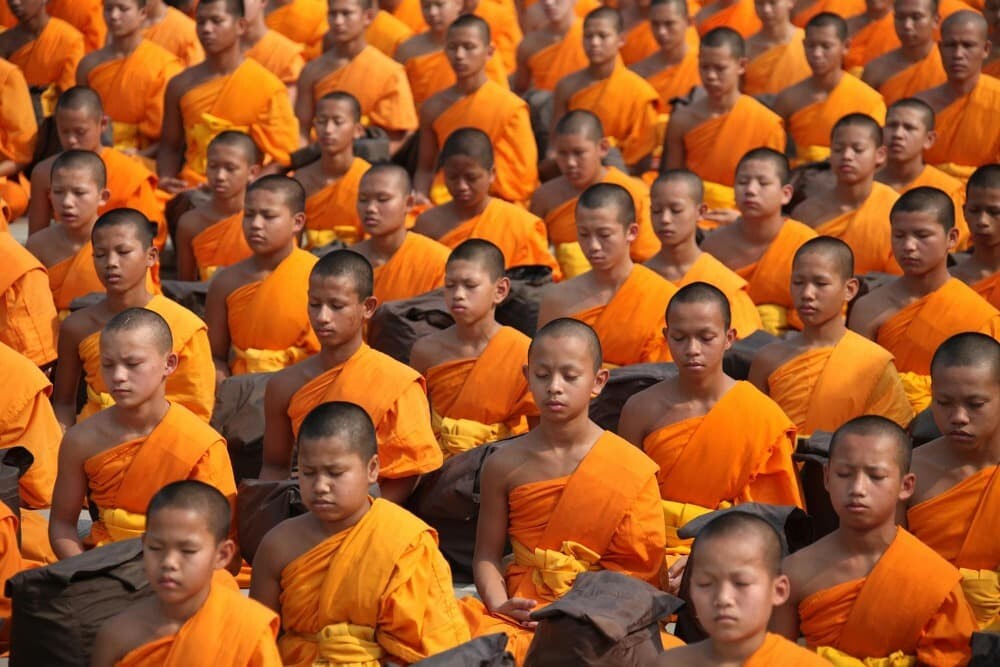There are many destinations where Cooperating Volunteers collaborates, with Buddhism as the main religion.
Among these destinations are Cambodia, Thailand, Sri Lanka, Laos, and Vietnam, where Buddhism is the majority religion. Additionally, in other countries like Nepal and India, Buddhism is practiced as a significant minority religion.
Buddhism is the fourth-largest religion in the world, following Christianity, Islam, and Hinduism, with an estimated 500 million followers worldwide. Although the majority of Buddhists reside in Asia, this religion also has a significant presence in other countries, including the United States, which boasts about 6 million followers.
Buddhism, a non-theistic religion that does not adhere to the belief in a creator god, is also regarded as both a philosophy and a moral discipline. It is based on the teachings of Siddhartha Gautama, a sage who lived in northeast India in the 6th century BC. According to legend, he was a former Hindu prince. After years of spiritual search and meditation, he achieved enlightenment, becoming Buddha, which means ‘the awakened one’. His teachings were based on: ‘The Four Noble Truths’, ‘The Noble Eightfold Path’, and the concept of Nirvana.

THE FOUR NOBLE TRUTHS
They represent the core of Buddhism, the diagnosis and solution of human suffering according to Buddha’s teaching.
- The truth of suffering (Dukkha): Life is marked by suffering, dissatisfaction, or insatiability. Nothing is permanent or perfect, leading to a state of incompleteness and discomfort.
- The origin of suffering (Samudaya): Suffering has a cause, which is desire or attachment. It is our tendency to cling to things, wanting them to be a certain way or not be another way.
- The cessation of suffering (Nirodha): There is a possibility of ceasing suffering by overcoming desire and attachment. This is achieved by reaching Nirvana, a state of liberation and inner peace.
- The path to the cessation of suffering (Magga): The Noble Eightfold Path is the guide to overcoming suffering and achieving liberation. This path consists of eight aspects: right view, right intention, right speech, right action, right livelihood, right effort, right mindfulness, and right concentration.
THE NOBLE EIGHTFOLD PATH
The Noble Eightfold Path is another central part of Buddhist teaching. It represents the path to the cessation of suffering and the realization of Nirvana and is comprised of eight aspects:
- Right view: Understanding reality as it is, including the Four Noble Truths.
- Right intention: Developing ethical and altruistic intentions, renouncing greed, anger, and ill will.
- Right speech: Refraining from lying, speaking in a hurtful or divisive manner, and speaking frivolously or meaninglessly.
- Right action: Refraining from harming others, stealing, inappropriate sexual conduct, and unethical behavior in general.
- Right livelihood: Earning a living in an ethical manner without causing harm to others.
- Right effort: Cultivating a positive will and dedication in the practice of good and avoidance of evil.
- Right mindfulness: Being fully aware of the present moment, observing the body, sensations, mind, and mental objects.
- Right concentration: Developing a focused and concentrated mind through meditation, achieving mental absorption states (jhana) and eventually liberation (Nirvana).

THE NIRVANA
Nirvana represents the state of liberation from suffering and the cycle of rebirths (samsara). It is the ultimate goal of Buddhism, where a person reaches a state of complete inner peace, serenity, and freedom from desires, achieving spiritual awakening and enlightenment.
Nirvana is not seen as a place but as a state of being that transcends the limitations of the material world, where there is no suffering, desire, or sense of self. It is a state of non-attachment, equanimity, and realization of the true nature of reality.
Achieving Nirvana implies a deep understanding and acceptance of the impermanence of things, the interconnectedness of all beings, and the realization of the emptiness of the self. It is a state of being beyond concepts and dualities, where one experiences ultimate freedom and peace.
These are just some of the aspects that make up the rich tapestry of Buddhism.




